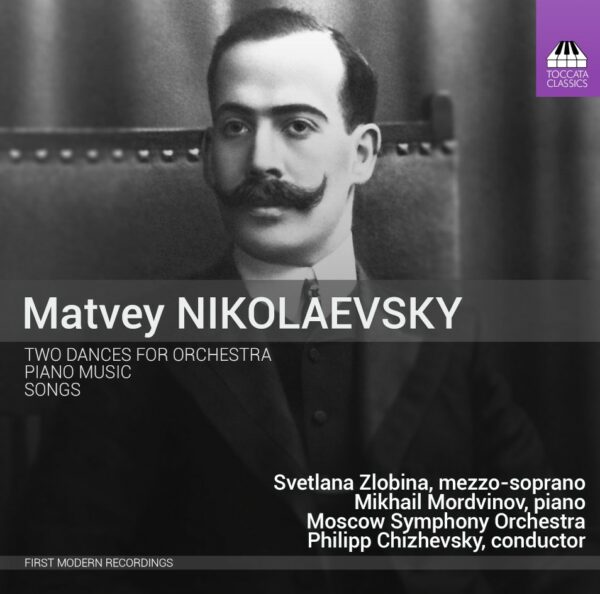Matvey Nikolaevsky: Songs and Dances
The Roaring Twenties roared in Russia as well as in Europe and America, to an extent generally unsuspected in the west. This CD reveals for the first time the light music of a minor master of the day, Matvey Nikolaevsky (1882–1942), whose songs and dances were hits in the early years of the Soviet Union. His style evolved effortlessly from the salon music of the late nineteenth century to the foxtrots, Charlestons and tangos popular during the relatively liberal New Economic Policy introduced by Lenin in 1921 and which Soviet audiences continued to enjoy after the NEP was abolished by Stalin in 1928.
Svetlana Zlobina, mezzo-soprano; Mikhail Mordinov, piano; Moscow Symphony Orchestra; Philipp Chizhevsky, conductor;
Listen To This Recording:
- Nocturne in C minor
- Fantasia on the Russian Folksong Korobeiniki
- Oh Come, Have Mercy – Gypsy Romance
- I Dreamed of Evening Skies
- To Admire You Forever
- Csardas
- Gypsy Dance
- Two Ballet Marches: Victory March
- Two Ballet Marches: Heroic March
- The Snuff-Box. A Musical Box for Piano
- A Day on the Volga: Musical Picture
- Tango Satanique
- Charlie-Fox: Charleston
- Jou-Re: Boston Waltz
- Miss Evelyn: Foxtrot (Shimmy, Two-Step)
- Hey, Enough of That!
- Old Sofron on the Bench
- The Road Runs Wide through the Fields
- The Bells Jingle on the Harness – Russian Song

Fanfare Magazine :
‘What a delightful surprise! … The Nocturne recalls Chopin, and the Fantasia (which is on a Russian folksong) sounds like the kind of transcription you might hear from Liszt, Thalberg, or Schulz-Evler. Both works are excellent examples of their genres, and show genuine melodic invention and compositional skill. But Nikolaevsky focused on the lighter side of music—writing music for dance bands, folk-style songs, romances, some filled with the darkness we associate with Russian music. But many of the pieces are joyous from beginning to end, clearly the product of a composer who knew his comfort zone. The titles, particularly of the solo piano works, tell you all that you need to know about the music. The lion’s share of the work on this disc falls to pianist Mordvinov, and he is splendid. He plays with great spirit and lightness of touch, but can also convey the dark underside of those pieces where it is present. … The two orchestral pieces are also performed with great vigor and spirit. Do not confuse “light” with “easy.” Nikolaevsky was, apparently, a virtuoso pianist and some of this music is quite difficult. The songs are sung with great feeling and understanding by Zlobina … for those who enjoy an occasional venture on the lighter side of music this is definitely worth seeking out.’
—Henry Fogel, Fanfare Magazine, March/April 2016
MusicWeb International :
‘The touching Nocturne echoes with the influence of Chopin and momentarily of a certain miniature by Sinding. The virtuoso Folksong Fantasia has a trillingly glistering Lisztian patina – at times suggestive of Balakirev’s Islamey and Grand Fantasia. The three songs from 1903 are soulful and strong on sentiment as are the four songs that conclude the disc. They are certainly not for tyro singers and the impressive Svetlana Zlobina presents them with technical aplomb and with a feeling for the words. She does not succumb to Slavonic vibrato. These should appeal to anyone who loves Russian romances. They are not populist in any 1920s mass culture sense.
The undated Csardas and Gypsy Dance are for orchestra. They strut and sway across the stage in a super-inflated tribute to the Radetsky March in the first case and every regal Hungarian cliché in the second. The two piano-solo ‘ballet marches’ might easily have found their way into a musical by Sousa or Herbert. Cut-glass charm is on show in The Snuff-Box, contrasting with the soulful ten-minute A Day on the Volga with its reminiscence of the famous boatman’s song also used by Glazunov in Stenka Razin. I am not sure that the Tango-Satanique merits its devilish title; it must have been a selling tag. The disc ends with the rapid-fire A Bell Jingles – a test trounced by Zlobina and the brilliant and emotionally eloquent pianist, Mikhail Mordvinov.
Toccata teach us a thing or ten about some neglected pages of Russian musical culture and entertain us into the bargain.’
—Rob Barnett, MusicWeb Internatioal
American Record Guide :
‘The songs, in the Russian Gypsy or folk idioms, are effectively sung— Zlobina has a rich, expressive voice.’
—Stephen Estep, American Record Guide, March 2016
DSCH Journal :
‘This disc then fulfils two very valuable needs: on one level, it’s a collection of enjoyable songs and piano pieces and a couple of orchestral works but, beyond that, it widens our view of Soviet music from 1903 to the late 1920s. […]
At over 82 minutes, this disc is packed to the gunwales and can only broaden our view of what “Soviet” music was. Both fascinating and enjoyable.’
—John Leman Riley, DSCH Journal